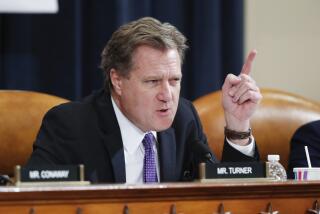Rep. Aspin Urges Democrats to Force Reagan to Continue Abiding by SALT II Missile Limit
- Share via
WASHINGTON — Rep. Les Aspin (D-Wis.), chairman of the House Armed Services Committee, called on his fellow Democrats in Congress on Thursday to force President Reagan to abide by the limits of the unratified second strategic arms limitation agreement.
Aspin’s remarks, in a speech at Georgetown University’s Center for Strategic and International Studies, put additional congressional pressure on Reagan to continue complying with provisions of the agreement, despite reports of Soviet violations.
The President is required by law to submit a report to Congress by Saturday on the status of his plans for complying with the 1979 SALT II treaty, whose limits would expire in December. His report could affect the outcome of a scheduled Senate vote next week on a proposal by Sen. Dale Bumpers (D-Ark.) calling for full U.S. compliance.
White House spokesman Robert Sims said Thursday that congressional pressure may force the President to decide the matter now, instead of waiting until later this year. “It is the only reason to make a decision right now rather than preserve our options,” he said.
Could Decide Monday
At the same time, Sims indicated that Reagan’s report will not be submitted to Congress until late next week, after the deadline set by Congress. He indicated that the final decision could be made by the President next Monday at a National Security Council meeting.
Outlining what he termed a “Democratic package” of positions on a wide range of defense issues, Aspin also called for a cutback in funding of Reagan’s “Star Wars” space defense program to keep it from violating an existing U.S.-Soviet treaty on anti-ballistic missiles. He said Congress should fully fund only research needed to determine the feasibility of a space-based missile defense shield.
Aspin acknowledged that some of his Democratic colleagues are more interested in trimming the overall defense budget than in making the selective cuts he intends to propose when the 1986 defense authorization bill comes up for consideration in the House in two weeks.
“Democrats must reorder defense priorities, not just by cutting, but by adding,” he said.
Administration officials are known to be deeply divided over whether to continue complying with SALT II, as both superpowers have pledged to do since 1981. The United States will exceed by 14 the treaty’s limit of 1,200 on multi-warhead intercontinental ballistic missiles when the nuclear submarine Alaska with its 24 missiles begins sea trials this fall, unless other missiles are dismantled.
Aspin said that by ending U.S. compliance with SALT II, the President would undermine the current arms talks in Geneva and open the way for Soviet development of offensive weapons that could make his “Star Wars” program, formally known as the Strategic Defense Initiative, unworkable.
‘New Order of Threat’
“If SALT lapses and the Soviets can freely expand their striking power, SDI would have to defend against a new order of threat,” he said. “A job that is already tough might become utterly impractical. We (Democrats) should jeopardize neither Geneva nor the SDI option. We should mandate actions to comply with SALT limits.”
Aspin said a decision on compliance should be made on the basis of whether there is progress in the U.S.-Soviet arms talks in Geneva, not to accommodate the deployment of a submarine. He said he will propose that additional money in the 1986 budget be used to dismantle the requisite number of missiles to keep the United States within the treaty’s limits.
Although the Armed Services Committee recommended authorizing $3.7 billion for “Star Wars” research in fiscal 1986, sources said Aspin will propose an amendment on the floor cutting it to about $2 billion. Bumpers is expected to offer a similar amendment next week when the Senate resumes consideration of its 1986 defense authorization bill.
Aspin said Congress should eliminate inefficient research spending for SDI and slow down work on systems that would violate the 1972 anti-ballistic missile treaty, while providing full funding for what he described as the “make-or-break” elements of the system. He said the United States should not violate the treaty until it knows whether “Star Wars” can work.
“At least until we have more solid answers about ‘Star Wars’ technology,” he said, “we should not test systems the treaty forbids.”
Defense Secretary Caspar W. Weinberger told reporters at a news conference Thursday that he is disturbed by the proposed cuts in “Star Wars” research because they are “rather consistent with some of the things that the Soviet negotiators have insisted upon in Geneva.”
More to Read
Get the L.A. Times Politics newsletter
Deeply reported insights into legislation, politics and policy from Sacramento, Washington and beyond. In your inbox twice per week.
You may occasionally receive promotional content from the Los Angeles Times.










